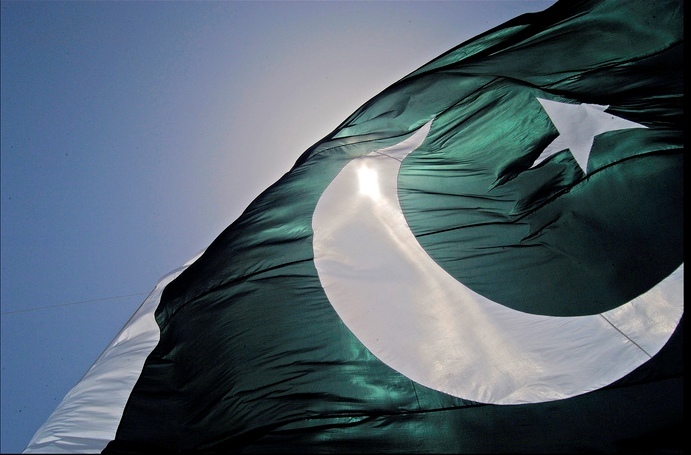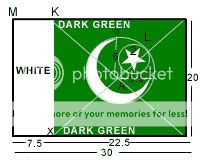Flag of Pakistan and State emblem of Pakistan

The National Flag of Pakistan (Urdu: پاکستان کا قومی پرچم) was designed by Syed Amir-uddin Kedwaii and was based on the original flag of the Muslim League, which itself drew inspiration from the flag of the Sultanate of Delhi and the Mughal Empire in India. It was adopted by the Constituent Assembly on August 11, 1947, just three days before the independence of Pakistan on August 14, 1947.The flag is referred to in the national anthem as Parcham-e-Sitāra-o-Hilāl in Persian (lit. Flag of the Crescent and the Star). The flag comprises a dark green field, representing the Muslim majority of Pakistan, with a vertical white stripe in the hoist, representing religious minorities. In the centre is a white crescent moon and a five-pointed star, which symbolize progress and light respectively.The flag symbolizes Pakistan's commitment to Islam, the Islamic world, and the rights of religious minorities.The flag is flown on several important days of the year including Republic Day and Independence Day.
Design
The official design of the national flag was adopted by the Constituent Assembly together with a definition of the features and proportions:
"A dark green rectangular flag in the proportion of length and width 3:2 with a white vertical bar at the mast, the green portion bearing a white crescent in the centre and a five-pointed white heraldic star. The size of the white portion being one-fourth the size of the flag, nearest the mast, the remainder three-fourths being dark green. The dimensions of the crescent and star are obtained as follows:
"Draw the diagonal from the top right hand corner to the bottom left corner of the green portion. On this diagonal establish two points 'A' and 'B'. Point 'A' at a distance equidistant from top right and bottom left hand corners of the green portion, i.e. the centre of the green portion. Point 'B' at a distance from the top right hand corner equal to 13/20th the width of the flag. With centre point 'A' and radius 1.1/4th the width of the flag describe a second arc. The enclosures made by these two arcs form the crescent. The dimensions of the five-pointed white heraldic star are determined by drawing a circle 1/10th the width of the flag. The circle surrounds the five points of the heraldic star. The star lies with one point on the diagonal at a point where the larger arc of the crescent, if completed, cuts the diagonal."
The Interior Ministry of Pakistan provides dimensions for flags in different circumstances:
* For ceremonial occasions. 21' x 14', 18' x 12', 10' x 6-2/3' or 9' x 6 1/4.
* For use over buildings. 6' x 4' or 3' x 2'.
* For cars 12" x 8".
* For tables 10 1/4" x 8 1/4".
Flag protocols
* No other flag must fly higher
* When displayed alongside provincial or corporate flags, the national flag must be higher
* When tied to a mast, it must be tied only at the left (at the beginning of the white bar) and left to fly freely without any obstruction
* Must not touch the ground or feet or anything unclean
* Must be raised at dawn and lowered at dusk (except on the Parliament of Pakistan, which is the only official building on which the flag is never lowered)
* Must not be marked with anything
* When raising: (i) must be saluted to by all uniformed personnel, (ii) others must stand in attention
* When displayed horizontally, the white strip must always be at the left, with green field on the right
* When displayed vertically, the white strip must always be at the top, with green field at the bottom
* Must not fly or be displayed upside down or with the crescent and star facing left
* Must not be displayed anywhere were it is likely to get dirty
Flag flying days
Date Position Reason
March 23 Full-mast Pakistan Day: Adoption of the Lahore Resolution (1940) and declaration of the Islamic Republic (1956)
April 21 Half-mast Death Anniversary of the National Poet, Muhammad Iqbal (1938)
August 14 Full-mast Independence Day (1947)
September 11 Half-mast Death Anniversary of the Father of the Nation, Muhammad Ali Jinnah (1948)
December 25 Full-mast Birthday of Muhammad Ali Jinnah (1876)
Any other day notified by the Government
Use by public officials
The use of the national flag is regulated by the Pakistan Flag Rules, which were introduced in 2002 by Prime Minister Zafarullah Khan Jamali. The Rules are not available online but there have been instances of misuse such as officials using flags on their vehicles when they are not entitled to do so.The national flag is flown on the official residences and vehicles (cars, boats, planes) of the following public officials:
Office Flag on Official Residence Flag on Vehicles
The President of Pakistan[10] Yes YesY
The Prime Minister of Pakistan[10] Yes YesY
The Chairman of the Senate YesY YesY
The Speaker of the National Assembly YesY YesY
The Chief Justice of Pakistan YesY YesY
The Governors of the Provinces YesY YesY
Federal Ministers (and officials entitled to the privileges of Federal Ministers) YesY
The Chief Ministers of the Provinces YesY YesY
The Ministers of the Provinces YesY
The Chief Election Commissioner YesY
The Deputy Chairman of the Senate YesY
The Deputy Speaker of the National Assembly YesY
The Speakers of the Provincial Assemblies YesY
The Chief Justices of the High Courts YesY
Ambassadors and High Commissioners of Pakistan YesY YesY
Commissioners of Divisions, Deputy Commissioners and Political Agents Yes( Flag on Official Residence )
Awards and recognitions
* In August 2004, Pakistan unfurled a 340x510 (173,400 square foot) foot National flag. The country held the record for producing the world's largest flag. It was rolled out in National Stadium Karachi in 2004
source:
http://en.wikipedia.org/wiki/Flag_of_Pakistan
State emblem of Pakistan
The State Emblem of Pakistan was adopted in 1954. The emblem's green colour and the star and crescent at the top are symbols of Islam, the religion with which most Pakistani citizens identify. In the center is a quartered shield, with each quarter containing a major crop of Pakistan at the time of its adoption: cotton, jute, tea, and wheat. The floral wreath around the shield is Poet's Jasmine (the national flower) and represents the Mughal cultural heritage of Pakistan. The scroll at the bottom contains the national motto in Urdu, coined by Muhammad Ali Jinnah, which reads from right to left: (Urdu: ایمان ، اتحاد ، نظم) Iman, Ittehad, Nazm translated as "Faith, Unity, Discipline".
source:
http://en.wikipedia.org/wiki/Coat_of_arms_of_Pakistan





